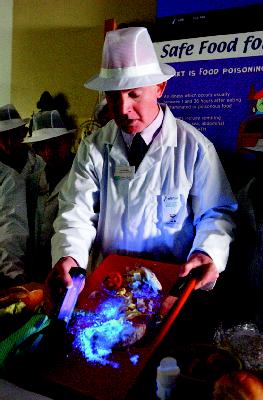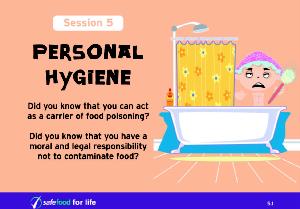| 2002 |

|
YEAR BOOK |
SAFEFOOD � THE FOOD SAFETY PROMOTION BOARD
|
Safefood for life
|

Launched in March 2002 into all secondary schools, Safefood for life is a new and exciting initiative. Designed by Safefood in conjunction with the Environmental Health Officers� Association (EHOA), and funded by the European Union, this new course is designed to educate transition year students in the general principles and simple practicalities of food safety. It is suitably positioned in the transition year programme to close the apparent void between learning for life and training for work.
At a time in their lives when many will be applying for their first part-time jobs or planning a life away from home while attending college, this course delivers practical information that will significantly reduce the risks taken by young people when working with food. In the current climate of food safety, the issue of training and education is vitally important. Many second level students work part-time in the retail and hospitality sectors with no training, and are often unaware of the risks involved. But this course is not just about work. It will provide students with skills and knowledge that will benefit them daily for the rest of their lives, whether or not they ever choose to work with food.
Transition year teachers are being urged to incorporate this course into their programme. Equally, the retail and hospitality trades are being asked to forge links with their local schools in providing support for this project. Through participation, catering and retail professionals can proactively help to foster a new generation of food service employees, with a heightened awareness of good food hygiene practices. This in turn will create the basis for radically reducing the incidence of food poisoning in Ireland.
The course deals with a broad range of subjects � including an overview of basic microbiology, food contamination, food hygiene law, personal hygiene, cleaning procedures and Hazard Analysis Critical Control Points (HACCP). These subjects are dealt with in a fun and interactive manner and are geared towards enabling the students and prospective food workers to see and understand where problems could arise in the preparation, handling, storage or service of food. If uncontrolled, these problems could create a risk of food poisoning to the consumer and cause subsequent damage to the food business.

The pack contains teachers� notes, student notes, acetates, a training video, a quick quiz for the end of each session, and sample exam questions and answers. It is structured as a nine session course, eight of which are for exam purposes � the ninth is an optional module which comprises a site visit where the students will visit a local retail or catering business, or a guest speaker from a local business will be invited to visit the school. The pack and associated materials are provided free of charge to each school. Students are asked to pay a nominal charge � this will entitle them to take part in the examination and, if successful, to obtain certification.
Postgraduate Fellowships
Safefood are also involved in the awarding of student fellowships at third level. Just started this year, the fellowship programme provides approximately �100,000/Stg�60,000 grant aid for PhD students to carry out novel research in the area of food safety. This year five research grants were awarded to researchers, and their chosen areas of research span the domains of microbiology, nutrition and toxicology. One of the more interesting projects this year is on the very topical subject of acrylamide. High levels of this potent carcinogen have been detected in a wide array of cooked starchy foods, including chips and breakfast cereals, giving rise for concern about the safety of certain foodstuffs. The researcher in Queen�s University hopes to develop simple and rapid techniques to measure acrylamide levels in cooked foods.
Other projects being funded this year are:
-
Listeria monocytogenes: an examination of the influence of food
constituents on survival and gastric transit (University College
Cork)
-
Incidence and survival of potential human pathogens in the
production of the common cultivated mushroom (University of
Ulster at Coleraine)
-
Interaction between B vitamins and homocysteine and its
relevance to a food fortification programme (Queen�s University
Belfast)
-
An investigation of the potential application of cDNA array
technology in testing the efficacy and safety of potential
functional food ingredients (University College Cork).
For further information on safefood and our activities please
contact: the Safefood Helpline;
Tel. ROI: 1850 40 4567; Tel. NI: 0800 085 1683;
E-mail: [email protected] ;
Web: http://www.safefoodonline.com